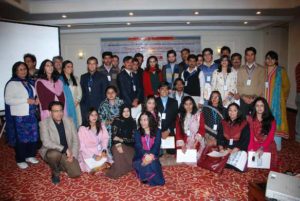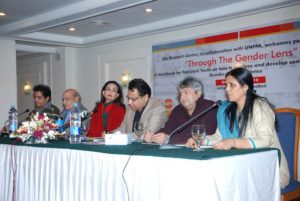Agents of Change: Youth Tackle Gender-based Violence
 Through the Gender Lens, a handbook — and also the culmination of a yearlong collaborative effort between Uks and UNFPA (United Nations Population Fund) and 39 youth selected from around the country — was launched in Islamabad on Human Rights Day, December 10.
Through the Gender Lens, a handbook — and also the culmination of a yearlong collaborative effort between Uks and UNFPA (United Nations Population Fund) and 39 youth selected from around the country — was launched in Islamabad on Human Rights Day, December 10.
Says Tasneem Ahmar the director of Uks, a research, resource and publication centre on women and media: “UNFPA approached us [Uks] in January this year in search of a partner who could train youth to create gender-sensitive media content on gender-based violence.”
Advertised through flyers in newspapers and at educational institutes, the response was overwhelming, says project coordinator Saadia Haq, who is also a radio producer. “We thought girls would not apply from a lot of the areas, but we were surprised when we received entries from areas of Balochistan, Khyber-Pakhtunkhwa (KP) — in fact small agencies of KPK — and Sukkur, etc.”
Aged between 15 and 25, the group of 39, which included an equal number of male and female members, hailed from both the urban centres and rural districts of the country: Chakwal, Jacobabad, Quetta, Peshawar, Waziristan, Mansehra, AJK (Azad Jammu and Kashmir), Lahore, Karachi and Islamabad. In March, the group met for the first time for a one-day orientation session in which they were introduced to the project, the aims of which were to create awareness regarding gender-based violence, promote gender equity and equality, and advance the view that women’s rights are human rights.
The participants went through a rigorous training process over the passage of the year. Divided into three groups according to their areas of interest (print, radio or TV), they were educated on what gender-based violence was, trained to deconstruct media messages (projections and stereotyping of women in the media as well as the manner in which gender-based crimes are reported) by monitoring a selected number of TV and radio programmes and print matter, and tasked to eventually produce gender-sensitive media content of their own. Once equipped with the gender lens and the technical skills, the youth returned to their respective hometowns to begin peer training — it was expected of them to pass on what they had learned to at least 35 people in their communities — and complete their media productions that they were required to turn in by the end of the year.
The peer-training sessions ranged from workshops, seminars and press conferences to rallies and processions. “In extremely difficult circumstances, amidst deteriorating law-and-order situations, despite cancellations, the participants continued their trainings,” says Haq. “They even sat people down at roadside hotels to pass on the message. Some of our youth members were even displaced by the floods, they were living in tents — in fact some still are — but still they turned in productions that swept me off my feet. They have exceeded all expectations.”
A panel comprising some of the members of the core group, including Dr Salman Asif (UNFPA), Amir Mateen (Senior Correspondent, The News, Islamabad), Rana Jawad (Bureau Chief of Geo TV, Islamabad), Tasneem Ahmar, as well as guest speakers Sherry Rehman and the director of the HRCP, I. A. Rehman, worked closely with the participants and addressed the audience.
Ms. Ahmar informed the audience how initially the participants couldn’t really communicate with one another. “Some couldn’t understand English, others couldn’t converse in Urdu — or didn’t want to,” she said. “There was hesitation. We saw a huge communication gap. That has been bridged now, and that is another success of the project. They have overcome whatever inhibitions they had as a group. They’ve all worked together and there has been no discrimination on the basis of anything.”
 Deliberating on gender-based violence, I.A. Rehman stated: “Gender violence is part of the Pakistani mindset; it is a part of the collective. We tried to get rid of this, but Zia-ul-Haq came along, and after that every man made it his duty to beat the woman — and women accepted their lot in life. I feel that there is an increase in gender violence today; it [the concept] is even embedded in the minds of those who call themselves progressive. The youth need to rid themselves of this inheritance.”
Deliberating on gender-based violence, I.A. Rehman stated: “Gender violence is part of the Pakistani mindset; it is a part of the collective. We tried to get rid of this, but Zia-ul-Haq came along, and after that every man made it his duty to beat the woman — and women accepted their lot in life. I feel that there is an increase in gender violence today; it [the concept] is even embedded in the minds of those who call themselves progressive. The youth need to rid themselves of this inheritance.”
These 39 youth who, according to Rana Jawad, have already reached out to people in their areas and beyond to spread awareness, were to him “passionate and inquisitive, like a new lease of life.” Amir Mateen stressed the need to strike a balance in newsrooms as far as a female presence was concerned, without which, he stated, reporting could not become gender sensitive. However, gender-based violence needed to be highlighted more in the mainstream media, he added.
“When nobody viewed media as a construct, as something that shapes reality,” said Sherry Rehman, “Tasneem started this project: how the media covers gender-based violence and how it projects stereotypes. This is a grassroots project.” Addressing the participants, she said that Uks had equipped them with a revolutionary tool and they should ensure that the initiative is taken forward, that it remains an ongoing process and they become the ‘agents of change’ everybody sees them as.
The handbook, which was provided to all the guests at the event, details the different activities the participants were involved in as part of their training. It is available in both Urdu and in English. It also serves as a training manual for those who want to conduct peer training of their own.
Farieha Aziz is a Karachi-based journalist and teacher. She joined Newsline in 2007, rising to assistant editor. Farieha was awarded the APNS award for Best Investigative Report (Business/Economic) for the year 2007-2008. She is a co-founder and Director at Bolo Bhi, an advocacy forum of Digital Rights.



